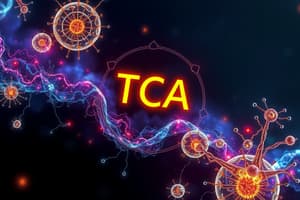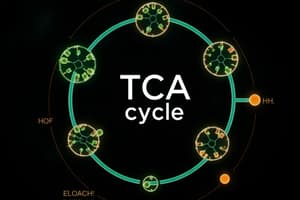Podcast
Questions and Answers
What is the primary role of NADPH in cellular processes?
What is the primary role of NADPH in cellular processes?
- It functions solely to detoxify reactive oxygen species.
- It is exclusively used for energy production.
- It serves as an electron donor in reductive biosynthesis. (correct)
- It is involved only in the synthesis of nucleotides.
Which enzyme is responsible for converting superoxide to hydrogen peroxide in antioxidant mechanisms?
Which enzyme is responsible for converting superoxide to hydrogen peroxide in antioxidant mechanisms?
- Glutathione reductase
- Glutathione peroxidase
- Superoxide dismutase (correct)
- Catalase
Glucose-6-phosphate dehydrogenase (G6PD) deficiency primarily affects which cellular mechanism?
Glucose-6-phosphate dehydrogenase (G6PD) deficiency primarily affects which cellular mechanism?
- Production of ATP in glycolysis
- Detoxification of reactive oxygen species (correct)
- Synthesis of fatty acids
- Regulation of the TCA cycle
In the context of antioxidant mechanisms in red blood cells, what is the role of glutathione peroxidase?
In the context of antioxidant mechanisms in red blood cells, what is the role of glutathione peroxidase?
Which of the following statements regarding reactive oxygen species (ROS) is correct?
Which of the following statements regarding reactive oxygen species (ROS) is correct?
What role does coenzyme Q (ubiquinone) play in the electron transport chain?
What role does coenzyme Q (ubiquinone) play in the electron transport chain?
Which complex does not pump protons across the mitochondrial membrane?
Which complex does not pump protons across the mitochondrial membrane?
Which of the following toxins inhibits the electron flow from complex IV to oxygen?
Which of the following toxins inhibits the electron flow from complex IV to oxygen?
What is the primary function of the H+ gradient generated during electron transport?
What is the primary function of the H+ gradient generated during electron transport?
Which of the following vitamins is NOT involved in the proper function of the electron transport chain?
Which of the following vitamins is NOT involved in the proper function of the electron transport chain?
What is the outcome of the absence of oxygen in the electron transport chain?
What is the outcome of the absence of oxygen in the electron transport chain?
What type of enzymes are complexes I-IV in the electron transport chain classified as?
What type of enzymes are complexes I-IV in the electron transport chain classified as?
Which mineral is vital for the proper function of the electron transport chain?
Which mineral is vital for the proper function of the electron transport chain?
Which process, associated with oxidative phosphorylation, occurs after electron transport?
Which process, associated with oxidative phosphorylation, occurs after electron transport?
In what way does complex IV contribute to the electron transport chain?
In what way does complex IV contribute to the electron transport chain?
Which enzyme is responsible for converting glucose to glucose-6-phosphate during glycolysis?
Which enzyme is responsible for converting glucose to glucose-6-phosphate during glycolysis?
What is the primary function of phosphofructokinase 1 in glycolysis?
What is the primary function of phosphofructokinase 1 in glycolysis?
During glycolysis, the conversion of fructose-1,6-bisphosphate produces which two molecules?
During glycolysis, the conversion of fructose-1,6-bisphosphate produces which two molecules?
What happens to dihydroxyacetone phosphate (DHAP) in glycolysis?
What happens to dihydroxyacetone phosphate (DHAP) in glycolysis?
Which phase of glycolysis is characterized by the generation of ATP and NADH?
Which phase of glycolysis is characterized by the generation of ATP and NADH?
Which organ primarily relies on anaerobic glycolysis for energy due to a lack of mitochondria?
Which organ primarily relies on anaerobic glycolysis for energy due to a lack of mitochondria?
What is true about the reaction catalyzed by hexokinase in glycolysis?
What is true about the reaction catalyzed by hexokinase in glycolysis?
Which substance is generated as a final product in anaerobic glycolysis?
Which substance is generated as a final product in anaerobic glycolysis?
Which statement is most accurate regarding glycolysis in muscles during strenuous exercise?
Which statement is most accurate regarding glycolysis in muscles during strenuous exercise?
What is the role of the enzyme triose phosphate isomerase in glycolysis?
What is the role of the enzyme triose phosphate isomerase in glycolysis?
Which molecule is known to inhibit citrate synthase during the TCA cycle?
Which molecule is known to inhibit citrate synthase during the TCA cycle?
What role does isocitrate dehydrogenase play in the TCA cycle?
What role does isocitrate dehydrogenase play in the TCA cycle?
How does ATP influence the TCA cycle?
How does ATP influence the TCA cycle?
Which of the following components is a product of the TCA cycle used in gluconeogenesis?
Which of the following components is a product of the TCA cycle used in gluconeogenesis?
What is the consequence of arsenic binding to lipoic acid in relation to the TCA cycle?
What is the consequence of arsenic binding to lipoic acid in relation to the TCA cycle?
Which cofactor is involved in the dehydrogenase reactions within the TCA cycle?
Which cofactor is involved in the dehydrogenase reactions within the TCA cycle?
Which of the following is TRUE regarding the production of NADH and FADH2 in the TCA cycle?
Which of the following is TRUE regarding the production of NADH and FADH2 in the TCA cycle?
Which enzyme catalyzes the conversion of pyruvate to oxaloacetate, thus replenishing the TCA cycle?
Which enzyme catalyzes the conversion of pyruvate to oxaloacetate, thus replenishing the TCA cycle?
Which enzyme is responsible for converting 1,3-bisphosphoglycerate to 3-phosphoglycerate in glycolysis?
Which enzyme is responsible for converting 1,3-bisphosphoglycerate to 3-phosphoglycerate in glycolysis?
What is the primary function of lactate dehydrogenase during anaerobic glycolysis?
What is the primary function of lactate dehydrogenase during anaerobic glycolysis?
Which hormones primarily regulate glycolysis by acting on hexokinase/glucokinase, PFK-1, and pyruvate kinase?
Which hormones primarily regulate glycolysis by acting on hexokinase/glucokinase, PFK-1, and pyruvate kinase?
In the irreversible reaction converting phosphoenolpyruvate to pyruvate, which molecule is produced alongside ATP?
In the irreversible reaction converting phosphoenolpyruvate to pyruvate, which molecule is produced alongside ATP?
Which statement best describes the fate of pyruvate under anaerobic conditions?
Which statement best describes the fate of pyruvate under anaerobic conditions?
Identify the steps of glycolysis that are reversible.
Identify the steps of glycolysis that are reversible.
What role does NAD+ play in glycolysis, especially under anaerobic conditions?
What role does NAD+ play in glycolysis, especially under anaerobic conditions?
Which of the following reactions occurs first in the glycolytic pathway?
Which of the following reactions occurs first in the glycolytic pathway?
What represents the overall reaction of glycolysis under aerobic conditions?
What represents the overall reaction of glycolysis under aerobic conditions?
What effect does insulin have on glycolysis?
What effect does insulin have on glycolysis?
Flashcards are hidden until you start studying
Study Notes
Citric Acid Cycle (TCA/Krebs Cycle)
- Occurs in mitochondria and oxidizes Acetyl CoA (2 carbons) to 2 CO2, maintaining a net input-output balance.
- Produces NADH, FADH2, and GTP (ATP equivalent) as key energy carriers for the electron transport chain (ETC).
- Net reaction: Acetyl CoA + 3 NAD+ + FAD + GDP + Pi → 2 CO2 + 3 NADH + FADH2 + GTP.
- Contains four redox reactions generating high-energy molecules; regulated by energy levels in the cell.
Key Enzymes and Regulation
- Citrate synthase catalyzes the first step (Acetyl CoA + Oxaloacetate → Citrate) and is inhibited by high citrate levels.
- Isocitrate dehydrogenase is the rate-limiting enzyme, activated by ADP and Ca++, and crucial for TCA regulation.
- Alpha-ketoglutarate dehydrogenase is inhibited by its own product, succinyl CoA, and NADH.
- Arsenic poisoning affects TCA by inhibiting dehydrogenase enzymes.
Anabolic Functions of TCA Cycle
- TCA intermediates are vital for synthesizing biomolecules:
- Citrate: Precursor for fatty acids and steroids.
- Alpha-ketoglutarate: Intermediate for amino acids.
- Succinyl CoA: Essential for heme synthesis.
- Oxaloacetate and malate: Precursor for gluconeogenesis.
- Anaplerotic reactions replenish intermediates, with oxaloacetate derived from pyruvate via pyruvate carboxylase.
Electron Transport Chain (ETC) and Oxidative Phosphorylation
- ETC is the final stage of oxidation, dependent on oxygen as the final electron acceptor to form water.
- NADH and FADH2 from TCA transfer electrons through complexes in the inner mitochondrial membrane.
- Proton (H+) pumping by complexes I, III, and IV creates a proton gradient to drive ATP synthesis via ATP synthase.
- Complex II (succinate dehydrogenase) does not pump protons.
- Vitamins (NAD+, FAD, FMN) and minerals (iron, copper) are essential for ETC function.
Complexes in the ETC
- Complex I: NADH dehydrogenase, pumps H+ while reducing Coenzyme Q.
- Complex II: Succinate dehydrogenase, utilizes FADH2 without H+ pumping.
- Coenzyme Q transfers electrons to complex III.
- Complex III: Cytochrome b-c1, receives electrons from Coenzyme Q and pumps H+.
- Complex IV: Cytochrome oxidase transfers electrons to O2, producing H2O and pumping H+.
Glycolysis Overview
- Stage I: Investment phase consumes 2 ATP; hexokinase/glucokinase phosphorylates glucose.
- Stage II: Payoff phase generates ATP and NADH, converting glucose to pyruvate or lactate.
- Anaerobic conditions lead to lactate production via lactate dehydrogenase, regenerating NAD+.
Regulation of Glycolysis
- Major regulatory enzymes: hexokinase/glucokinase, phosphofructokinase (PFK-1), and pyruvate kinase.
- Insulin promotes glycolysis, while glucagon inhibits it to maintain blood glucose levels.
Non-Oxidative Reactions of Pentose Phosphate Pathway
- Converts ribulose-5-phosphate to ribose-5-phosphate (for nucleotide synthesis) or to glycolytic intermediates.
NADPH Functions
- Crucial for reductive biosynthesis, antioxidant defense, and nitric oxide synthesis, particularly in fatty acid biosynthesis.
Reactive Oxygen Species (ROS) and Cellular Damage
- ROS are highly reactive; can damage lipids, proteins, and nucleic acids.
- Superoxide dismutase (SOD) and catalase are key enzymes in detoxifying superoxide and H2O2.
G6PD Deficiency
- An X-linked recessive disease causing hemolytic anemia due to inadequate NADPH production.
- Reduced NADPH levels impair antioxidant mechanisms in red blood cells, leading to oxidative damage.
Studying That Suits You
Use AI to generate personalized quizzes and flashcards to suit your learning preferences.




